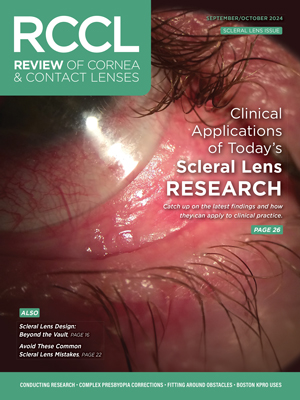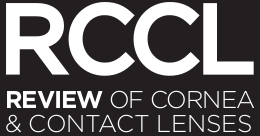 |
Of the more than one million new cases of herpes zoster virus (HZV) reported each year, about 20% result in ocular complications, including corneal insult.1 As eye care providers, we should be prepared to recommend the vaccine to patients older than 50, considering HZV is a relatively common cause of ocular disease.
What’s at Stake
Herpes zoster ophthalmicus (HZO) presents with a long list of ocular complications both infectious and inflammatory in nature, such as persistent keratitis, conjunctivitis, scleritis, uveitis, acute retinal necrosis, cranial nerve palsies and optic neuropathy.1 Long-term complications include cataracts, glaucoma, corneal scarring and postherpetic neuralgia (PHN). At least 30% and as many as 50% of HZO patients will experience chronicity.1 Associated complications include a 4.5x increased risk of stroke within the first year of being infected.
To ward off these ill effects, clinicians should recommend vaccination when the opportunities arise. The Shingles Prevention Study showed reasonable efficacy for the vaccine Zostavax (live-attenuated vaccine, Merck).2 Studies estimate a 38% to 70% reduction in HZV after vaccination (age-dependent) and a 60% to 70% reduced risk of PHN. Cost analysis studies suggest younger patients accrue the greatest benefit, as the vaccine’s effect wanes in older patients—most studies suggest five to eight years of protection that decreases after five years.3 Patients with a history of HZO may have recurrent ophthalmic, dermatologic or even disseminated disease after vaccination.
Despite the benefits this vaccines provides, health care providers have done a poor job educating patients on the benefits of shingles vaccination; only 28% of eligible patients have been vaccinated with Zostavax.
A New Option
Recent approval of a new vaccine, Shingrix (recombinant, sub-unit vaccine, GlaxoSmithKline), has renewed interest in shingles vaccination. The vaccine combines an antigen (glycoprotein E) and an adjuvant system (AS01B) to generate a strong, long-lasting immune response. Shingrix has shown an incredible age-independent efficacy of 92.7% and an 88.8% efficacy against PHN.4 The vaccination stimulates the cellular immune system for at least one year. The new vaccine requires a two-dose schedule (two to six months apart) with an 11% adverse event rate (severe headache, pain and fatigue).4 Because up to 6% of those affected by HZO may experience recurrent eye disease, patients with active disease should hold off vaccination for a year or two.
Questions and Concerns
Uncertainties and controversies can cause widespread falsehoods, most of which can be easily explained:
- Vaccination after shingles. The CDC has not made a formal statement except to say that the vaccine shouldn’t be given during the acute phase.
- Stopping antivirals before/after vaccination. This is not necessary for Shingrix since it maintains over 70% “potency,” even when patients are on antivirals.2 Zostavax requires cessation two days prior to and two weeks following vaccination.4
- Vaccination for patients with active keratouveitis or corneal dendritiform. Authorities suggest waiting until there is some improvement with chronic or recurrent disease states; beyond one to two years is reasonable.
- Shingrix after Zostavax. Because they have different formulations, Shingrix can still be given.
- Vaccination for immunosuppressed or compromised patients. While no formal recommendation against vaccination has been issued for Shingrix, immunocompromised or compromised patients should not receive Zostavax since it’s a live-attenuated vaccine and comes with concern for disseminated disease.
Considering the overall morbidity of this potentially devastating disease, we should definitely advise eligible patients to receive the new vaccine for herpes zoster. Taking the opportunity to have the appropriate discussion with patients might just prevent a debilitating disease. Prevention is the only foolproof treatment.
1. Cornea Society, Ocular Microbiology & Immunology Group and AAO Quality of Care Secretariat, Hoskins Center for Quality Eye Care. Recommendations for herpes zoster vaccine for patients 50 years and older. Ophthalmology. 2016. www.aao.org/clinical-statement/recommendations-herpes-zoster-vaccine-patients-50-. Accessed September 15, 2018. 2. Gelb LD. Preventing herpes zoster through vaccination. Ophthalmology. 2008;115(2):35-8. 3. Merck Medical Advisory, April 2016. Personal communication. 4. GlaxoSmithKline Medical Advisory, January 2018. Personal communication. |


